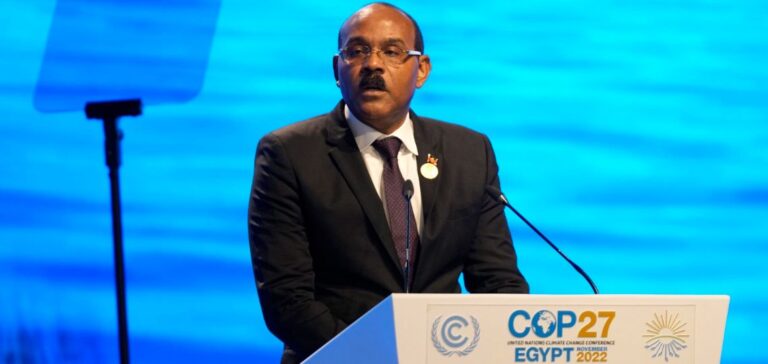The Prime Minister of Antigua and Barbuda has called, on behalf of small island states, for a global tax on the profits of oil and gas companies to fund compensation for countries in the South hit by climate disasters.
“In the first half of this year, six fossil fuel companies made more money than needed to cover the costs of major climate damage in developing countries, with nearly $70 billion in profits,” Gaston Browne launched at the COP27 climate conference in Sharm el-Sheikh, Egypt.
“It is time for these companies to pay a global carbon tax on these profits to finance the losses and damages,” he demanded, on behalf of the Alliance of Small Island States (Aosis) threatened by rising waters.
This demand echoes that of UN Secretary General Antonio Guterres, who in September called on rich countries to “tax the windfall profits of fossil fuel companies” to redistribute them to countries suffering from the impacts of climate change and to populations affected by inflation.
The question of the losses and damages (or prejudices) suffered by the countries of the South, which are hardly responsible for global warming but which are cruelly affected by it, has been officially included in the agenda of the major UN meeting on climate.
“This is just one step,” Gaston Browne warned. “We must unequivocally establish a fund for loss and damage at this COP” and it will be “only a modest token when our members lose up to 2% of their GDP in a day due to a single climate event,” he ruled.
He announced in the wake of the creation of a “commission” registered with the UN and composed of small island states to “explore the responsibility of certain states for the injuries caused by their climate actions and failures to meet their obligations.
Tuvalu on Tuesday called for the adoption of a “non-proliferation treaty for fossil fuels”.
The small archipelago has thus joined Vanuatu, another Pacific nation, in its desire to create a mechanism to regulate fossil fuel production and prepare the transition to renewables.
“The seas are warming and beginning to engulf our land, inch by inch. But the world’s addiction to oil, gas and coal will not drown our dreams under the waves,” said Tuvalu’s Prime Minister Kausea Natano.
The desired treaty must ensure “a just transition away from fossil fuels,” he said.






















